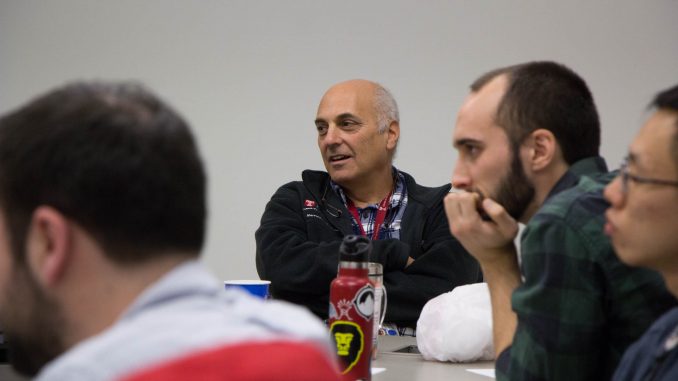
After working as a staff writer at The Philadelphia Inquirer for more than 30 years, Michael Vitez knew there were more stories to be told.
“I just came up here, what I like to say, to help build a culture of stories,” said Vitez, director of Narrative Medicine at Temple University. “I believe that stories are so powerful and so important, and such a fundamental part of medicine and then if I can promote a culture of stories I will help create better doctors.”
Vitez established the Narrative Medicine Program as a part of the Medical Humanities and Narrative Medicine Program at the Lewis Katz School of Medicine. It started three years ago and now runs workshops with residency programs and students to reflect on their experiences, develop attention and teach electives in humanities for medical students.
The term narrative medicine was coined at the University of Columbia in 2000. It means to strengthen a clinical practice by recognizing, absorbing and interpreting stories of illness, which in turn improves health care, according to Columbia University Irving Medical Center.
Narrative medicine develops a doctor’s ability to pay attention to the stories of their patients and to teach them narrative skills, like how to listen and tell stories, Vitez said.
As part of the program, Vitez organizes “story slams” twice a year where students and health professionals share stories about their medical work in competition for the best story. The program held its sixth slam on Oct. 16, and the next one will be in February 2020.
“We have read all kinds of stories, some are very sweet and funny, some are very personal about their own families,” Vitez said. “Sometimes, we get faculties who remember things that they did when they were young that have stayed with them, good or bad, all these years.”
At the latest slam titled “Experiencing the Unexpected,” there was a three-way tie for first place. Jen Eurich, a second-year medical student, spoke about her first time seeing a patient die in the trauma bay, Rachael Smith, a second-year medical student, talked about the death of her father and how it will make her a better doctor, and Christopher Goodwin, a physician at Temple University Hospital, spoke about his encounter with a man who experienced homelessness and his dog.
Goodwin said the slam is special because of the way Vitez shows people they can be a storyteller.
“The way [Vitez] has initiated it and encouraged participation, there is a great sense of openness and collectiveness to drown as many different voices, as many different perspectives for diversity,” Goodwin added.
For Vitez, the story slam event is a safe space around peers to share human stories.
“It is a competition in name only,” Vitez said. “It is a celebration. Everyone is a winner.”
He said he thinks medicine focuses too much on data and scans, driving doctors away from patient relationships.
“I am just trying to help doctors to find more satisfaction in their work and do that by trying to build this culture of stories to try to celebrate the humanities in all their forms,” Vitez added.
Katya Ahr, a third-year medical student and a participant in the slams, chose to come to Temple because of this program.
“There is so much that medical professionals are provided to that a lot of people aren’t,” Ahr said. “I think there is a lot of emotion and processing involved in these situations that it is an important thing to have an outlet for those sort of things.”
Vitez hopes the slams will continue to grow, and eventually become a popular and meaningful tradition at Temple.
He wants to have even greater variety of participants, like dentists and pharmacists, he said.
“Stories are how we communicate with each other, with our patients, with the world,” he added. “I believe stories heal, I believe stories inspire, I believe stories build community, I believe stories can change the world.”



Be the first to comment